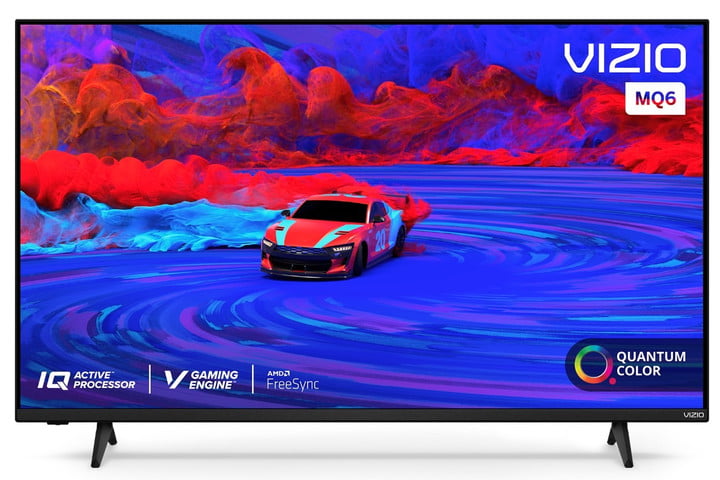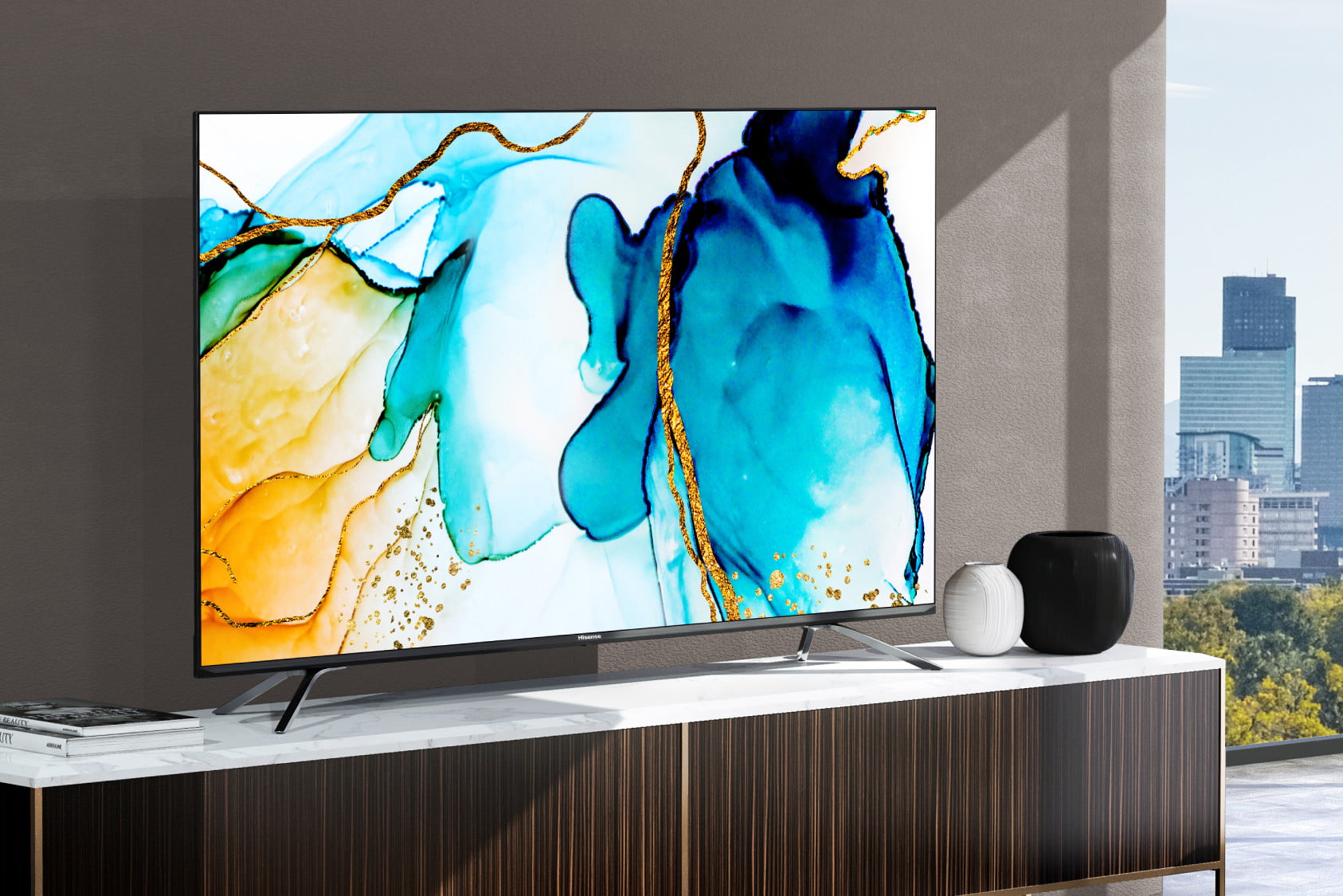You don’t have to break the bank to own a high-quality 4K TV, especially as we head into a new year and prices start coming down on last year’s models. There are a number of recognizable brands, such as Samsung, TCL, Hisense, and LG, that offer models with impressive picture features like HDR and VRR for hardcore gaming — and for less than $500! And while some 4K TVs in this range may not be the biggest out there, as larger screens with premium performance specs often translate to steeper costs, the TVs we’re talking about typically have screens that are 60 inches or less, but do not skimp out on quality or features.
Unfortunately, the pandemic has wreaked havoc on supply chains for all kinds of products — smart TVs included. This has led to higher prices and thus fewer choices of models that fall in the under-$500 category. Luckily, our top pick, the 50-inch Hisense H8G, has come back down under the $500 mark, and with its amazing brightness and color accuracy it’s a steal. We also take a look at some of the other stand-out entries in this category in our roundup of the best 4K TVs under $500.
Want a bigger screen or a TV that will make gaming more enjoyable? Check out our other affordable picks below.
See more
Best 4K TVs under $500 at a glance
50-inch Hisense H8G Quantum
Why you should buy this: It’s got an ultra-bright display for amazing HDR and Dolby Atmos, too.
Who it’s for: Movie fans searching for a TV that will look amazing even in bright rooms.
Why we picked the 50-inch Hisense H8G Quantum 4K UHD TV:
Hisense is another brand that is quickly establishing a reputation for high-quality TVs that are also incredibly affordable, which is why we chose the HG8 as our top pick for the best 4K TV under $500. The H8G pulls together some very impressive features like a quantum dot LED display, Dolby Vision and Dolby Atmos compatibility, and full-array local dimming. These are the kinds of things we’re used to seeing on much more expensive models.
The literal highlight for the H8G is its brightness. Whether it’s displaying standard or high dynamic range content, the display can get much brighter than most of the other TVs on this list, which not only helps with combatting brightly lit rooms but also lets HDR material pop more spectacularly.
The H8G uses a VA LCD panel, which means that viewing angles aren’t quite spot-on, but the contrast is excellent, and blacks are nice and inky. To get way better contrast ratios, you’d need to spring for an OLED TV at more than double the price of this Hisense model.
With Android TV, you get some great extra features, too. Chromecast is built-in, as is Google Assistant, which you can access from the voice-based remote control. Just like with a Roku TV, you can use voice commands to control the TV and volume, open apps, and manage playback. But because it’s a Google Assistant device, you can also ask it to do any of the things a Google smart speaker can do, like provide weather forecasts, or answer nagging questions about who directed that movie you just watched.
The Hisense H8G is also a pretty good choice for gaming and sports, with 240Hz motion control and several auto game mode enhancements.
50-inch Vizio M-Series Quantum

Why you should buy this: It’s one of the few QLED TVs in this price range with features tailored specifically for gamers.
Who it’s for: Gamers looking for a quality display to accurately portray what they’re playing.
Why we picked the 50-inch Vizio M-Series Quantum 4K UHD TV:
Quite frankly, the Vizio M-Series Quantum is an amazing all-around TV, but we’re highlighting it for its unusually strong support for console and PC gaming.
Variable refresh rate (VRR) is one of the most important features a TV can have when it comes to gaming. The M-Series Quantum has VRR, but not just standard VRR — it sports AMD’s FreeSync, which is used by Xbox consoles, as well as many PC gaming rigs. VRR ensures that the TV always stays in sync with a game’s changing frame rates. TVs that can’t do this create a “tearing” effect, which can be jarring and negatively impact overall gaming performance.
Add to this Vizio’s V-Gaming Engine, which automatically adjusts several other settings to reduce input lag and response times, and support for 60Hz 4K signals, and you’ve got a great 4K gaming TV for a great price.
The M-Series Quantum has comprehensive HDR support, with HDR 10, HDR 10+, Dolby Vision, and HLG compatibility, plus HDMI ARC/eARC for lossless sound quality when connected to a compatible soundbar or A/V receiver.
Vizio has added a lot of other valuable features to its smart TVs recently, like Apple’s AirPlay 2, Apple HomeKit, and Chromecast. It will also work with Siri, Google Assistant, and Amazon Alexa if you have a smart speaker for one of these assistants. Plus you can use your voice to control major functions via the included voice remote.
These all make the 50-inch Vizio M-Series Quantum a very capable smart TV.
TCL 55-inch 5-Series Roku TV
Why you should buy this: It offers incredible picture features like QLED lighting and HDR support for prices that are hard to find.
Who it’s for: Picture enthusiasts that don’t want to pay the premiums of premium TV brands.
Why we picked the TCL 55-inch 5-Series Roku TV:
TCL TVs are everywhere these days, and we’re big fans of what they’re offering. In fact, we would say that the TCL 55-inch 5-Series Roku TV offers some of the best features all around, especially when it comes to picture quality and color.
For starters, the 5-Series doesn’t skimp when it comes to illumination. Opting for QLED lighting, the 5-Series delivers an unbelievable spectrum of vibrant colors and arresting brightness — at least for the price. Sure, you might find QLED lighting looking and feeling a bit more supreme on a Samsung TV, but you’ll be paying for it, too. But back to the 5-Series.
Layered on top of the QLED panel is support for Dolby Vision HDR, as well as HDR10 and HLG support. Whether you’re watching a 4K Blu-ray or streaming UHD-HDR content from Netflix, the 5-Series decodes today’s leading picture codecs for an image filled with lifelike hues, depth, and richness often not seen at this price level.
The 5-Series has some picture features that didn’t quite mesh with us (particularly around the QLED lighting), but with a little tweaking here and there, we were able to fix some of these troubles.
The 5-Series is also a great set for gaming, thanks in part to the Auto Game Mode that automatically detects game systems connected via HDMI. Once you start gaming, the 5-Series will adjust color, brightness, and latency instantaneously, ensuring your gameplay will run smoothly and look fantastic.
TCL also offers an incredible smart TV experience powered by the Roku OS and featuring support for both Alexa and Google Assistant. With hundreds of apps to choose from and assistant support for finding the best movies and shows, there’s no shortage of content to consume — making the TCL 55-inch 5-Series Roku TV an all-around great pick.
Samsung 43-inch AU8000
Why you should buy this: It’s one of the best small-sized TVs on the market.
Who it’s for: Those looking for a great picture for a bedroom, dorm, or small living room.
Why we picked the Samsung 43-inch AU8000:
Samsung often features prominently in leading TV roundups, netting a ton of love from us across multiple categories, from performance to smart TV capabilities. When it comes to buying a TV for your bedroom, it can be tempting to dive for the bargain-bin model. Not that there’s anything wrong with that, but in most cases, spending an extra hundred dollars or so can get you a much better set. Such is the case with the Samsung 43-inch AU8000.
Right off the bat, Samsung comes out swinging with this small-sized entry — at least in terms of picture quality. Equipped with a VA panel, the AU8000 delivers contrast levels typically reserved for larger and higher-priced TVs. While there’s no local dimming to be found here, the AU8000 is great for dark room-viewing. Consider it our top pick for late-night Netflix binges.
Samsung’s Dynamic Crystal Color and HDR10+ support adds vibrant and lifelike colors to the mix. Admittedly, there’s a little too much latency at times, especially when it comes to low-lit scenes — an issue that, combined with the set’s edge-lighting, can make transitions a bit hit or miss. These are small troubles, though, and hiccups that are more than made up for by the set’s overall color, contrast, and brightness.
Smart TV devotees will be more than pleased with the AU8000’s Tizen-powered OS, offering hundreds of apps to choose from, voice controls, and assistant support for Alexa, Google Assistant, and Bixby.
The Samsung 43-inch AU8000 may not be the strongest set in terms of performance, but for a bedroom, dorm, or compact living room, it’s one of our favorite small-screen options, with plenty of features and smart add-ons to round things out.
Research and buying tips
Are 4K TVs under $500 any good?
Yes, but stick to the brands that have a good track record for quality products. We’re very confident that our picks above will satisfy your desire for a good TV.
What size 4K TV can I afford for $500?
The answer to that depends on the brand, but you’ll be looking at around 60 inches or less. As prices have increased, the screen sizes you can get for $500 have been getting smaller.
Can I buy a 4K TV with HDR for less than $500?
Yes, though its HDR performance (often a function of peak brightness) may not be quite as striking as that of more expensive screens — so set your expectations accordingly.
Can I get an OLED TV for less than $500?
In short: No. OLED TVs are still very expensive to produce, and at the moment, only one company (LG Display) makes them for non-industrial applications. This may change as Samsung or other companies decide to enter the OLED market.
Are 4K TVs under $500 good for gaming?
That’s contingent on the television, but if you find something with minimal input lag and advanced game modes — like the Vizio M-Series Quantum — you should be impressed.
Can I use a 4K TV for under $500 with a PC?
Yes, so long as your computer has an HDMI output. Adapters can be used for other output types but frequently do not pass along audio.


